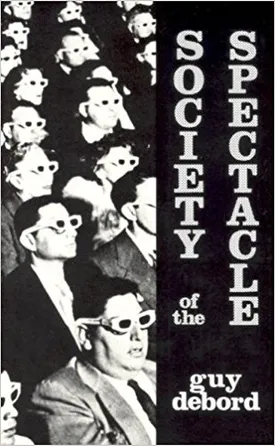Society Of The Spectacle by Guy Debord
The Society of the Spectacle is a 1967 book written by French philosopher Guy Debord. It is considered a seminal text of the Situationist International, the avant-garde movement that heavily influenced 20th-century philosophy and made a lasting impact on the arts. In his book, Debord argues that within modern day society, the relations of production have been mediated by the spectacle – that is, the subordination of society to the demands of the market and its manufactured needs and desires. Debord claims that this spectacle creates a false sense of happiness and fulfillment as it separates us from our immediate experiences and limits our ability to interact meaningfully with others.
The idea of the spectacle is quite complex and can be broken down into two distinct concepts. The first is what Debord calls the "built-in society of the spectacle." This is the idea that humanity has been engulfed in a manufactured world of images, symbols, and slogans that serve to shape individuals into a collective and conformist mass. This built-in society does not allow for an individual to think for themselves or act freely, as they are constantly being bombarded with false messages from the media, government, and corporations. The second concept is what Debord refers to as the "persistent environment of the spectacle." This is the idea that the spectacle has become so pervasive in modern life that it is not only used to shape our ideas and our behavior, but also to control our experiences and emotions.
One of Debord's main points is that the society of the spectacle is detrimental to our authentic way of life. He argues that living in this false environment of images and symbols leads to alienation (not to be confused with estrangement) – a widespread feeling of estrangement and disconnection between people. Under the spectacle, individuals are no longer connected to their authenticity or the things they once valued, instead they find themselves relying on artificially-created desires and aspirations. As these desires can never be satisfied, people are ultimately doomed to a life of unfulfilled promises and profound disappointment.
In addition to alienation, Debord also argued that the spectacle creates a sense of false happiness. This false happiness is created by an environment that encourages us to define ourselves and our value in terms of consumer products and services. This consumer-driven environment allows us to ignore true needs in favor of those presented to us in the market. As a result, individuals come to believe that fulfillment and satisfaction can be found through consumer products and services, distracting them from real issues such as poverty, injustice and inequality.
Debord concluded his book by stating that the society of the spectacle must be attacked, dismantled, and opposed in order to restore true freedom and connection to humanity. He argued that individuals must take control of their lives away from the imposed environment of the spectacle, and construct a life that is based on their true needs and desires. Only in doing this can people experience a sense of authentic happiness and fulfillment.
The Society of the Spectacle has had a huge impact on contemporary philosophy, politics, and culture and remains a highly influential text in the world of critical theory and social commentary. Debord's analysis of the effects of the spectacle on our lives still rings true in today's world, as we grapple with issues such as inequality, consumerism, and alienation. It stands as one of the most important and influential works of 20th-century philosophy, and is essential reading for anyone wanting to gain a better understanding of contemporary society.

